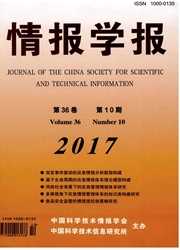

 中文摘要:
中文摘要:
针对当前主流语义Web服务匹配方法过分强调服务请求与服务广告的精确匹配从而导致用户在实际中难以获得真正所需要的Web服务、或在服务自动发现与集成任务中计算负荷过大的问题,本文把基于本体的概念语义相关性度量模型引入Web服务匹配,提出一个新的更“轻便”的语义Web服务匹配模型。该模型使用一系列概念组分别描述服务的服务类别、输入、输出、前提、效果等诸方面的语义信息,在此基础上通过基于本体的概念组之间的相关性度量模型分别评价服务请求与服务描述在这些方面的语义匹配度。总体语义匹配度被定义为输入、输出、前提、效果方面的语义匹配度的加权和。基于这一匹配模型,本文进而研究了相应的服务匹配器原型。初步的数据试验表明,本文所提模型能较好地适应用户需求表述的模糊性,从而提高服务匹配的召回率;从计算复杂性看,本文所提模型也优于基于严格逻辑推理的语义Web服务匹配模型。
 英文摘要:
英文摘要:
Today's mainstream methods for semantic Web Services matchmaking stress the strict matching between requests and Service advertisements, which may in practice cause the low recall of Web Services actually fitting the user requests, and exacerbate the high computational load of the matching process in an automatic Service discovery and composition task. To address this, a novel lightweight semantic matchmaking model is proposed in the present paper, which incorporates an ontology-based conceptual relatedness measure into Web Services matchmaking. In the proposed model, a series of concept collections are used to describe a Service' s semantic information from the aspects of Service category, inputs, outputs, conditions, and effects, respectively. With such semantic descriptions, an ontology-based relatedness measure is suggested to assess the matching degrees between a Service request and a Service description in terms of these aspects. The overall matching degree between the request and the Service description is treated as the weighted-summation of the matching degrees of these aspects. Following the suggest matchmaking model, a corresponding matchmaker prototype is furthermore investigated. The primitive data experiments show that the proposed model is suitable to address the problem of vagueness on expressing the user requests, and therefore to improve the recall of matchmaking. The proposed model also shows superiority to the strictly-logic-based matchmaking methods in the sense of computational complexity.
 同期刊论文项目
同期刊论文项目
 同项目期刊论文
同项目期刊论文
 期刊信息
期刊信息
